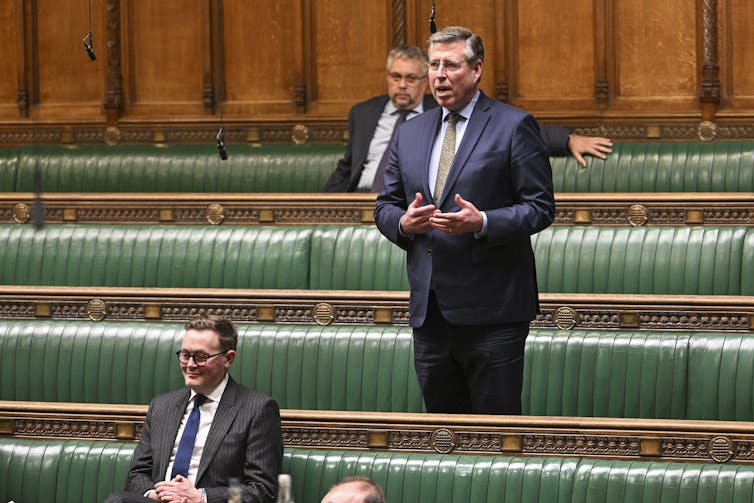At the last count, 118 MPs have announced they will not contest July’s general election. The vast majority – more than 75 – are Conservatives (or former Conservatives who have been suspended from the party).
They include veterans such as Graham Brady, chairman of the backbench 1922 Committee, former prime minister Theresa May, and former cabinet ministers Dominic Raab and Ben Wallace. Even some of the 2019 cohort, such as Dehenna Davison, intend to leave after just one term.
Of course some MPs step down at every election. Some decide to pursue other interests, some just want to step away from the national political scene. However, we do tend to see spikes in the numbers of MP stepping down ahead of general elections where a subsequent change of government is likely, particularly from the incumbent party. For example, in 1997 the highest proportion of MPs standing down were Conservative, whereas in 2010, Labour MPs represented the highest proportion of those quitting.

Want more general election coverage and analysis from The Conversation’s academic experts?
Sign up for our new, weekly UK politics newsletter, delivered every Friday throughout the campaign and beyond.
The number of MPs who have already announced they are stepping down ahead of the next general election is as high as in 2010. And the departure of so many Conservatives creates a significant electoral headache for Sunak, who is already facing an uphill struggle. Seats where the sitting MP steps down have a history of underperforming for their party at the subsequent general election, compared to seats where the MP has stayed in place.
So a party which is behind in the polls, and already likely to see widespread falls in its vote share, can expect to see even more substantial falls in seats where one of its MPs retires. For some of these seats in 2024, an MP stepping down could be the difference between the Conservatives winning or losing the seat. Esher and Walton, where Raab is leaving behind a seat with a very small majority (taking into account boundary changes), is just one of the areas of concern.
The vulnerability of these seats can come down to the fact that an MP has represented a constituency for a long time and has built up a personal vote among people who might otherwise be lukewarm on their party. Local voters may feel more attached to an MP who is a familiar face with a track record of delivering for the constituency. A new, unproven candidate may make them think twice in the polling booth.

Those who are cabinet ministers or other senior party figures, also bring to their constituency an element of kudos associated with their positions. At a time when a party is unpopular, voters are again less “sticky” if a replacement candidate is on offer rather than a former minister.
Can anything be done?
Tracking what might happen in 2024 is a little more complex because the boundary lines between constituencies are being redrawn, but these changes are unlikely to change the pattern in Sunak’s favour. With his party so far behind in the polls and with recent by-elections showing that even Conservative seats with very large majorities are at risk of being lost, any MP stepping down adds an extra layer of vulnerability.
Sunak may be able to take some steps to mitigate the loss of personal votes in seats where his MPs are standing down. My research has shown that choosing the right candidate to stand is key. They shouldn’t be someone who has already fought a general election somewhere else in the country. A track record of this kind implies that party HQ is keen to get the candidate into Westminster, regardless of whether they know the local area. Counterintuitively, the evidence suggests they also shouldn’t be someone who went to school locally – but we don’t really know why that is.
Sunak should instead choose someone who has ties to the seat – such as by living there or working there. It should also ideally be someone who has fought and won other elections locally, such as former local councillors, who come with the added bonus of being used to campaigning in the local area and are well-versed on local issues.
With the election now rapidly approaching, and some Conservative candidates yet to be confirmed where the MP has stepped down, time is running out to choose the best candidates possible to try and offset this unwelcome extra vulnerability.

